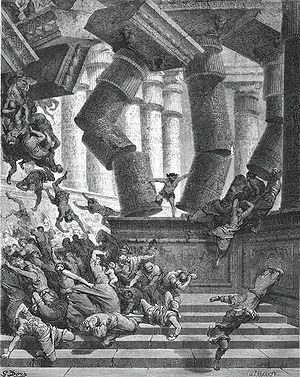 Image via Wikipedia
Image via WikipediaDecisions were made made for Samson before his life ever began. As a child he observed the Nazirite vow and no doubt heard the prophecy about his future. But did Samson ever make a decision to accept God's choices for him? Did Samson ever chose God?
One of Samson's first adult decisions, to marry a Philistine woman, was not only a violation of God's Law but also a rejection of his parents' wishes. Later, on his way to arrange the wedding, he walked through vineyards. In and of itself, that is not bad but it showed a desire to explore the grey areas of God's Law for him. As a Nazirite, he was not permitted to drink wine or to have his hair cut. True, the vineyard is not an alcoholic beverage, but there is a strong association with wine. On this initial trip, when a lion attacked him in this vineyard, the Spirit of the Lord came upon him with power so that he was easily able to kill it. God communicated to Samson that he would protect him against hostile forces.
Through this lion attack, God also revealed himself to Samson in a personal and in an intimate way. God saved Samson's life and also gave him the opportunity to evaluate what he was doing in the vineyard. Scripture states that he didn't tell his parents about the lion; maybe he didn't want them to ponder this sign from God; maybe Samson didn't want to meet God yet.
On the way to the wedding, Samson went out of his way, again through the vineyard, to look at the lion's carcass. Samson found a beehive inside the carcass and scooped honey out of it. By touching a corpse, Samson again rejected God's Law for the Nazirite and became ceremonially unclean. Not only did he eat some of this honey himself, but he also brought some to his parents, who ate not knowing its source.
Leading up to this ill-fated wedding, Samson had made numerous, conscious decisions to violate God's Law. Normally a joyous occasion, this wedding feast was a tortured event because the Philistines blackmailed Samson's bride into aiding them to solve the riddle. Anger and massacre consummated the celebration.
Samson stormed away from his bride and wedding feast, not to return for several months. When he returned during the wheat harvest, to visit his bride, he was informed that she was now someone else's wife. Enraged, Samson exacted revenge on the Philistines by using three hundred foxes to torch their fields and vineyards. After the Philistines burned down the house of his bride's family, Samson fought them even more viciously.
Until now, while Samson did fight the Philistines, it was more of a reactionary skirmish rather than a planned military feat. Rather than turning to God for wisdom or direction, Samson trusted in his own strength, which was supernatural but confined to the way in which he saw fit to use it.
An escalating exchange of hostilities between Samson and the Philistines resulted in Judah's alignment with vengeful Philistine forces. Judah turned Samson over to the Philistines, a thousand of whom Samson slaughtered with a donkey's jawbone. After this battle, Samson's first prayer was recorded. Dehydrated from the battle, Samson realized that in his power, he could not satisfy his thirst. He called out to God to provide water.
When faced with his weakness, Samson recognized his need for God. Perhaps it was at this moment that Samson made a decision to have a relationship with God; to call the God of Israel his own. Nevertheless, I also wonder if, during the ensuing twenty year period of peace, Samson drifted away from his need for God, from his relationship with God. Immediately following the peaceful interlude, is recorded the notorious story about Samson and his love with another Philistine woman named Delilah.
Again spurning God's Law, Samson entered into an adulterous relationship with Delilah. Because she agreed to betray Samson into the hands of the Philistine, Delilah persistently prodded Samson each night that he spent with her to reveal the source of his strength to her. Samson fibbed; Delilah acted on his information and then called in the Philistines; Samson was always able to break the bonds.
Because this pattern repeated a few times, Samson knew that Delilah had conspired to cripple him. Yet, although he finally told her what he thought might be close to the truth, he was surprised to see that his strength really left him after Delilah cut his hair. Scripture states that he expected to shake himself free of the Philistines. Since the hair was the outward manifestation of his relationship with God, maybe God left him because Samson abandoned even a superficial allegiance to him.
The Philistines gouged his eyes out and imprisoned him. In this weakened, humiliated position, as Samson's hair began to grow back, perhaps he also drew closer to the God of Israel. When he was marched out as a spectacle for the Philistines reveling in their success against the God of Israel, Samson was recorded as praying to God, the source of his unusual strength, to strengthen him once again so that he could avenge himself on the Philistines. Samson also asked that he might die with the Philistines.
In the end, Samson, a Judge in Israel, died after he accepted the relationship that God wanted to have with him. Unfortunately he lived his life his way: died childless and without a wife; died without brilliant military campaigns; died with a legacy of being known for his rage and unbridled sexual exploits. Fortunately, before he died, he understood that God was the only true source of his strength.






